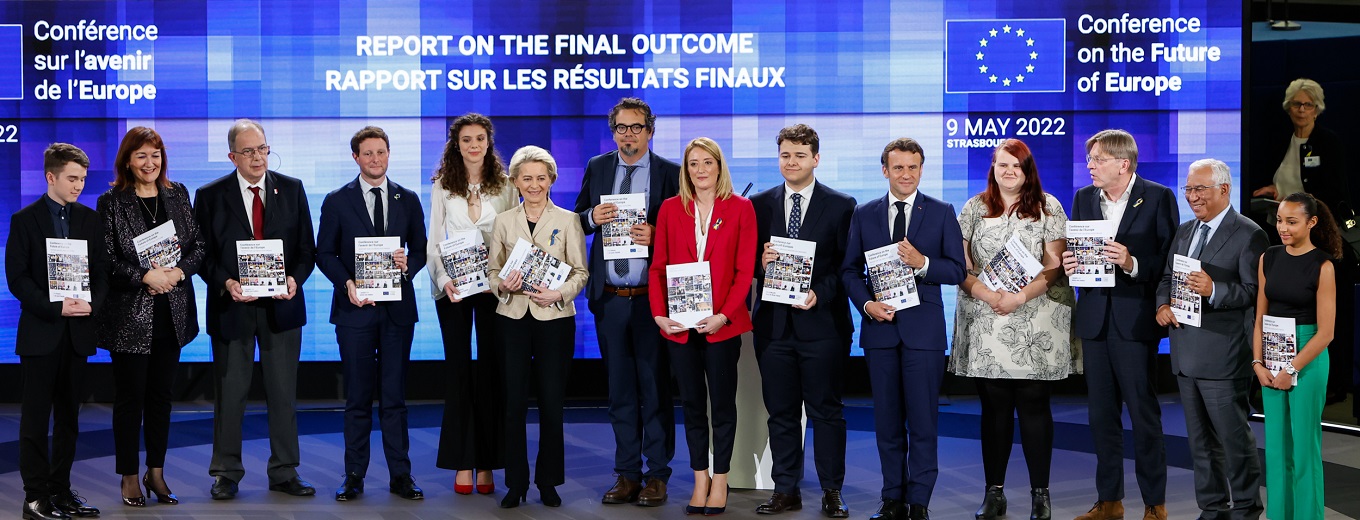The final report, which contains proposals from citizens on the future of Europe, includes strong references to education and youth.
The Conference on the Future of Europe (CoFoE) began in May 2021 as a democratic exercise in which 800 citizens participated to express their vision and debate their vision for the future of the European Union. This unprecedented exercise of transnational democracy entailing the participation of randomly selected citizens was initiated jointly by the European Parliament (EP), the Council of the EU and the European Commission (EC) together with Member States. The outcome of the Conference is a final report which was delivered to the Presidents of the three institutions on 9 May 2022 in Strasbourg. The report contains 49 proposals which include more than 300 measures covering nine thematic areas: i. climate change and the environment; ii. health, iii. a stronger economy, social justice and jobs; iv. EU in the world; v. values and rights, rule of law, security; vi. digital transformation; vii. European democracy; viii. migration; ix. education, culture, youth and sport.
Overall, the citizens are calling for a more integrated Europe by insisting on treaty change, especially the proposal to replace the unanimity vote in Council decisions to a qualified majority vote for all matters except for the admission of new members to the EU and changes to the fundamental principles of the EU. The citizens also wish to see more competence in the hand of the European Union. In the field of education specifically, the measures proposed by the citizens aim at giving the EU a shared competence at least in the field of citizenship education (Proposal 46.1) – which would require a treaty change – as well as developing a common module on civic education about democratic processes, EU values and the history of Europe (Proposal 37.1 and 46.2). Another aspect that needs to be further elaborated is the implementation of the mutual recognition of professional degrees and trainings between Member States (Proposal 15.3 and 46.1). The citizens also want the European Union to focus more on ensuring access to digital literacy and skills (Proposal 31.2) and to health and sexual education (Proposal 9.2) but also on the development of soft skills at school such as critical thinking, resilience, understanding and respect for others (Proposal 46.2). Some of the citizens’ priorities resonate with the developments already done at the EU level. For instance, the citizens wish to see the ecological issues being addressed in schools from an early age on (Proposal 6). The European Commission Proposal for a Council Recommendation on learning for Green Transition and Sustainable Development (formerly entitled Council Recommendation on learning for environmental sustainability), which is expected to be adopted in June 2022, fulfils this citizens’ request. The same goes for the development of lifelong learning with the European Commission Proposal for a Council Recommendation on individual learning accounts. The citizens further suggested ideas and initiatives in the field of youth, such as the voting in European Parliament elections from the age of 16 (Proposal 47.1) or the ban of unpaid internships (Proposal 47.5)
In parallel to the Conference on the Future of Europe, the 25 Percent Project was created in order to ensure that the voices of the young people who are not currently involved in political participation – for example, young people who dropped out of school or live far from big cities – will be heard. A report collecting over 4’000 ideas on the same nine areas from the CoFoE from young people living in 30 European countries was published. This report reflects the needs and wishes of young people and the work to be done by the relevant European stakeholders and institutions to meet these needs. In the field of education, the European youth want to see the scope of education broaden to include and strengthen topics as business education, citizenship, sex education, religious education as well as knowledge that one can use in a daily life. Furthermore, there should be more investment in education in order to provide high quality, affordable and accessible education for all. Finally, the young people ask for more efforts to make the different educational systems in Europe more compatible and to recognise non-EU degrees.
To follow-up on the Conference, the European Commission plans to host an event in about six-months to give an update on the implementation of the proposals. Technically, there is no binding rule compelling the EU to pass any of the proposals, but the expectation is high from the citizens and youth people to see the measures implemented. However, 13 EU Member States have already signed a letter fighting the outcomes of the year-long initiative, in particular the proposals to change the EU treaties which suggests that it might be difficult to implement the measures presented in the report.

